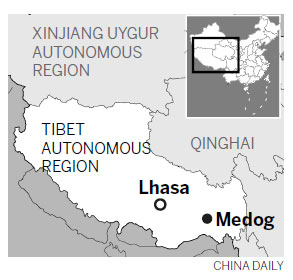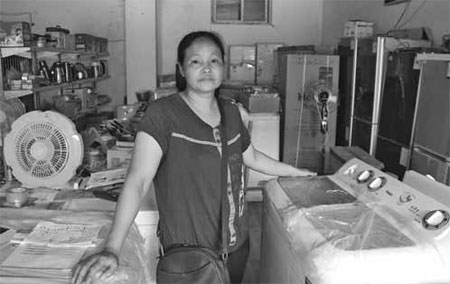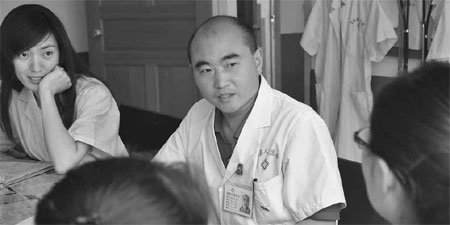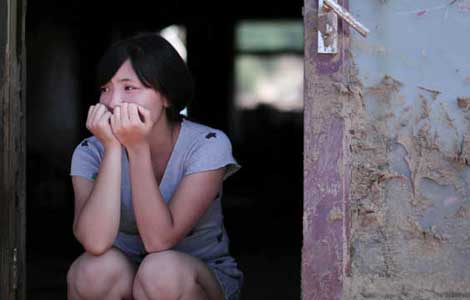A country practice
Updated: 2013-08-26 06:57
By Liu Xiangrui, Wang Huazhong and Daqiong (China Daily)
|
||||||||

|
Liu Gesheng at his office in Medog county town. Kuang Linhua / China Daily |
|
Chen Xianxiu at her electrical-appliance store. Wang Huazhong / China Daily |
|
Doctor Deng Shengming has a meeting with his colleagues at Medog's county hospital. Liu Xiangrui / China Daily |

Conditions are basic, medical staff lack training and equipment lies unused, but Doctor Deng Shengming says conditions in Medog have never been better. Liu Xiangrui, Wang Huazhong and Daqiong report from the Tibet autonomous region.
Editor's note: Medog county in the Tibet autonomous region is the last in China to be connected to the outside world by a paved road. Early last month, four reporters from China Daily took eight hours to drive along the 117-km Zhamog-Medog motorway, which starts high in the frigid mountains at an elevation of more than 4,300 meters. They found the road had helped reshape lives of local people, opening their minds and putting them on a fast track to development. The reporters now tell the stories of the people they interviewed during their one-week stay in the once isolated and desolate county.
When he was assigned to a clinic in rural Medog 15 years ago, Deng Shengming, freshly graduated from medical college, had no idea what the place was like.
His first impression of Medog, located in the southeast of the Tibet autonomous region, was the poor roads. In 2012, the county remained the last to be linked to China's road system.
He spent five days on tough mountain tracks before arriving in the county town. He walked another day to reach the township where he was to work.
"I thought about escaping the place when I saw the poor conditions there," says the 39-year-old from Yunnan province, adding that the idea to leave lingered for quite a while.
But he finally decided to stay. It took a lot of effort to adapt to local life, Deng recalls.
"I saw that local people needed doctors badly. As a medical worker, I didn't have the heart to leave," Deng says.
Early struggles
He worked in the township clinic for three years. Conditions were very primitive. The thatched houses' wooden floors were full of holes, Deng's most sophisticated medical device was a stethoscope.
"Those were terrible days," says Deng, though he is now able to recall the past with a smile.
Besides working at the clinic, Deng had to make regular rounds to different villages. It often took days on mountain roads to reach some remote villages, and there were dangers including landslides and falling debris.
Deng says he once almost fell into a deep valley while walking on a mountain path.
"But the saddest thing for me was to see my patients die and as a doctor I couldn't even diagnose their diseases," Deng says.
Most doctors in Medog then had limited medical knowledge and facilities and medical services were seriously behind the national standard, Deng recalls.
Surgery success
Deng had a rare chance to receive one-year training outside Medog in 2001, and he made history by completing the first surgery in the county after he returned and started working in the county hospital in 2002.
The success of the surgery, despite being very small, made Deng well-known around the town. In 2004, he completed the first major surgery ever performed in the county.
It was an emergency Cesarean section for a 36-year-old mother, who was having difficulty giving birth.
Deng had to overcome different challenges then. Surgeries - which require cutting with a knife on the body - were against local tradition, and the patient's family didn't agree to the surgery for two days.
Meanwhile, risk of infection was high as there were limited facilities and no professional surgery assistants. Blood supply was also a big problem because of the poor roads.
"I was not a professional gynecologist. I was under great pressure, as it was my first time to perform such surgery," recalls Deng.
However, the situation gave him no time to hesitate. It usually took several days on bumpy mountain roads for pregnant mothers, on foot or on stretchers, to get to hospitals outside Medog.
"But there was no time, and the mountain roads were too risky for her," Deng recounts. "I was snatching at straws."
He can still recall his nervousness.
"When I finally took out the baby, I felt that I had no strength to hold it because I was trembling," Deng says. Several assisting senior doctors had never seen a real surgery before that moment.
There was only a small hydropower station in Medog and medical equipment often wore out or didn't work properly because of the unstable voltage.
"No one knew how to fix them once they were broken," Deng says.
Electricity was often cut. They had to perform operations by flashlight in some urgent cases, says Deng, who finished operations, including a hernia, with several people holding flashlights for light.
"The patients' lives will be in danger if we don't do surgery because it usually takes too long to transport them out."
They were finally able to properly use their X-ray scanner in 2010, when the county got a larger power station.
Now the director of Medog's county hospital, Deng says the improvement of the roads in recent years has greatly benefited his work.
"The road has really saved lives of many, especially critical patients who need to be sent to better hospitals urgently," he says.
Meanwhile, medicines can easily be brought in by vehicles. Before, medicines for the whole county were brought in on human backs. They were ordered once a year and had to endure several transfers before arriving in town.
"We were short of medicines, and often they went out of date in the transfer station on the mountain because we were unable to bring them," Deng says. It was even harder to bring in medical equipment, and damage during transport was common.
"Though most of them had limited medical knowledge, medical workers would refuse rare chances to train outside because it'd take them nearly 10 days walking on the bad roads," Deng adds.
Regional diseases, such as malaria, had a high mortality rate in the past because of limited medical staff and diagnosis facilities.
Improved services
Thanks to increased funding from the central government and aid from other provinces, medical services in Medog have improved significantly in recent years, according to Deng.
The cure rate of regional diseases has increased greatly since 2006, when the nation carried out a disease-control program in the region.
Now Deng's hospital has more than 40 staff members, whose number has been growing gradually. It receives about 10,000 patients every year and performs more than 70 regular operations.
Local people's health awareness has improved over the years. In the past, many rural people would not visit hospitals until their diseases got very serious or even incurable.
"Such cases are becoming rare," Deng says, adding that local people's increased incomes and the nation's new cooperative medical care system for rural residents has greatly relieved people's health problems.
Challenges remain
However, Deng admits that medical work in Medog still faces challenges.
"It's difficult for us to attract talented doctors from outside, and too few local students choose medicine when they go out to study," Deng says.
Short of hands, all the doctors in his hospital are general practitioners and must learn to do different kinds of surgical operations. Though much valuable equipment has been donated to his hospital in recent years, few people know how to use it.
For example, the newly equipped electro-encephalograph has been put aside and there is no stomatology department in his hospital, despite the equipment being available for several years.
"Sometimes they seem like scrap for us," Deng sighs.
Contact the writers through
liuxiangrui@chinadaily.com.cn.
(China Daily USA 08/26/2013 page9)
Most Viewed
Editor's Picks

|

|

|

|

|

|
Today's Top News
Newly born panda cub at Washington zoo doing fine
Market regulators need to fix loopholes
Singapore PM aims to cement relations
Experts call for details on rumor cases
Joint sea drill shows improved relations
Bo insists he did not abuse power
UN to probe alleged chemical attack
Using stray cats for rat control sparks debate
US Weekly

|

|


















